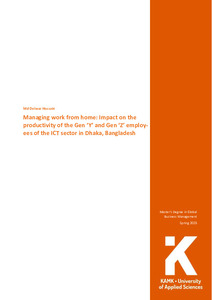Managing work from home: Impact on the productivity of the Gen ‘Y’ and Gen ‘Z’ employees of the ICT sector in Dhaka, Bangladesh
Hossain, Md Delwar (2023)
Hossain, Md Delwar
2023
All rights reserved. This publication is copyrighted. You may download, display and print it for Your own personal use. Commercial use is prohibited.
Julkaisun pysyvä osoite on
https://urn.fi/URN:NBN:fi:amk-2023060320987
https://urn.fi/URN:NBN:fi:amk-2023060320987
Tiivistelmä
The thesis aims to investigate how working remotely affects Gen Y and Gen Z workers' productivity in the ICT sector of Dhaka, Bangladesh. It also examines the difficulties and chances these workers encounter when working remotely. The thesis seeks to determine how companies in Dhaka, Bangladesh's ICT industry, may promote efficiency among their Gen Y and Gen Z remote workers. It also suggests that businesses foster an inclusive and efficient remote workplace for their staff.
The thesis is to investigate the effects of work-from-home implementation on the productivity among Generation Y and Generation Z workers in the ICT industry of Dhaka, factors affecting the efficiency of their work while working remotely, approaches adopted by businesses to organise teams working remotely, and sustain productivity; and the efficacy of these approaches in minimising difficulties encountered by employees and their effects on productivity.
The study's methodology uses semi-structured interviews and qualitative methods to examine the work efficiency of Gen Y and Gen Z workers in Dhaka, Bangladesh's information and communication technology (ICT) industry. The study's data collection and analysis used purposive sampling, thematic analysis, and ethical issues. The thesis discusses the conclusions of the thematic evaluation of transcripts of interviews on how remote work affects Gen Y and Gen Z workers' productivity in the ICT industry in Dhaka, Bangladesh. The study found that while productivity and work-life balance can both be enhanced by remote work, there are also issues with collaboration and communication. These difficulties can be minimised, and the effectiveness of arrangements for remote work can be ensured by adequate company assistance and resources.
The thesis is to investigate the effects of work-from-home implementation on the productivity among Generation Y and Generation Z workers in the ICT industry of Dhaka, factors affecting the efficiency of their work while working remotely, approaches adopted by businesses to organise teams working remotely, and sustain productivity; and the efficacy of these approaches in minimising difficulties encountered by employees and their effects on productivity.
The study's methodology uses semi-structured interviews and qualitative methods to examine the work efficiency of Gen Y and Gen Z workers in Dhaka, Bangladesh's information and communication technology (ICT) industry. The study's data collection and analysis used purposive sampling, thematic analysis, and ethical issues. The thesis discusses the conclusions of the thematic evaluation of transcripts of interviews on how remote work affects Gen Y and Gen Z workers' productivity in the ICT industry in Dhaka, Bangladesh. The study found that while productivity and work-life balance can both be enhanced by remote work, there are also issues with collaboration and communication. These difficulties can be minimised, and the effectiveness of arrangements for remote work can be ensured by adequate company assistance and resources.
